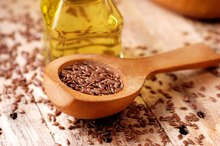What does fact checked mean?
At Healthfully, we strive to deliver objective content that is accurate and up-to-date. Our team periodically reviews articles in order to ensure content quality. The sources cited below consist of evidence from peer-reviewed journals, prominent medical organizations, academic associations, and government data.
The information contained on this site is for informational purposes only, and should not be used as a substitute for the advice of a professional health care provider. Please check with the appropriate physician regarding health questions and concerns. Although we strive to deliver accurate and up-to-date information, no guarantee to that effect is made.
Safflower Oil Allergy
Safflower oil is commonly used as a natural laxative and for cooking 1. The website Drugs reports that safflower oil can cause an allergic reaction, manifesting in the form of rhinitis, hives and asthma 1. Most symptoms develop with in a few minutes or up to an hour after ingesting safflower oil 1. If you experience adverse reactions after using safflower oil, discontinue use and talk with your doctor 1.
If you are experiencing serious medical symptoms, seek emergency treatment immediately.
Safflower Oil Allergy
An allergic reaction to safflower oil is caused by an overreaction to the substance by the immune system 1. The immune system doesn’t recognize the oil as a harmless substance and attempts to ward it off, according to MedlinePlus. The immune system begins to defend itself by producing antibodies. The antibodies signal mast cells to create histamine, a hormone that causes inflammation in soft tissues in the body. Excessive amounts of histamine are the main cause of allergy-related symptoms.
- An allergic reaction to safflower oil is caused by an overreaction to the substance by the immune system 1.
Symptoms
Fish Oil and Swelling
Learn More
Rhinitis is a common symptom of a safflower oil allergy, causing nasal congestion, sneezing, a runny nose, eye irritation, post-nasal drip and sinus headaches 1. Allergic skin rashes, such as hives or eczema can develop as a result of a safflower allergic reaction, according to the Drugs website 1. Hives and eczema both cause inflammation in the skin that is extremely itchy and elevated. If scratching opens the skin, the body may is vulnerable to secondary skin infections. Asthmatic reactions, such as shortness of breath, difficulty breathing, wheezing and coughing may also develop as a result of a safflower allergy.
- Rhinitis is a common symptom of a safflower oil allergy, causing nasal congestion, sneezing, a runny nose, eye irritation, post-nasal drip and sinus headaches 1.
Testing
In order to properly confirm and diagnose a safflower allergy, you may have to participate in allergy testing. The two main tests used to diagnose an allergy are skin tests and blood tests, according to the American Academy of Allergy, Asthma and Immunology. A small amount of safflower oil is placed under the skin to see if it causes an adverse reaction, such as inflammation 1. During a blood test, you are exposed to the allergen and then the allergist draws blood to test it for high levels of IgE antibodies.
- In order to properly confirm and diagnose a safflower allergy, you may have to participate in allergy testing.
- During a blood test, you are exposed to the allergen and then the allergist draws blood to test it for high levels of IgE antibodies.
Treatment
Can Flax Oil Cause Rash?
Learn More
MedlinePlus states that the most effective treatment for a safflower oil allergy is to identify it and then avoid consuming or touching the substance 1. All the symptoms of a safflower oil allergy can be treated with antihistamines 1. Rhinitis is also treated with decongestants that alleviate nasal congestion. Skin rashes are treated with hydrocortisone or corticosteroid creams to reduce itching and swelling.
Consideration
If you experience hives, shortness of breath and dizziness after consuming safflower oil, you may be experiencing anaphylactic shock, a severe allergic reaction that could lead to death 1.
Related Articles
References
- Drugs.com: Safflower Oil
- MedlinePlus: Allergic Reactions
- Schagen SK, Zampeli VA, Makrantonaki E, Zouboulis CC. Discovering the link between nutrition and skin aging. Dermatoendocrinol. 2012;4(3):298-307. doi:10.4161/derm.22876
- Memorial Sloan Kettering Cancer Center. Vitamin E. Updated February 6, 2015.
- Norris LE, Collene AL, Asp ML, et al. Comparison of dietary conjugated linoleic acid with safflower oil on body composition in obese postmenopausal women with type 2 diabetes mellitus. Am J Clin Nutr. 2009;90(3):468-76. doi:10.3945/ajcn.2008.27371
- Thalheimer, Judith C. RD, LDN, RD, LDN Heart-Healthy Oils: They're Not All Created Equal. Today's Dietitian. Vol. 17 No. 2 P. 24 February 2015
- Muth, Natalie Dugate, MD, MPH, RD, CSSD, FAAP. Sports Nutrition for Health Professionals F.A. Davis Company. 2015
- Vannice, Gretchen, and Heather Rasmussen. “Position of the Academy of Nutrition and Dietetics: Dietary Fatty Acids for Healthy Adults.” Journal of the Academy of Nutrition and Dietetics 114.1 (2014): 136–153. doi: 10.1016/j.jand.2013.11.001
Writer Bio
Diane Marks started her writing career in 2010 and has been in health care administration for more than 30 years. She holds a registered nurse license from Citizens General Hospital School of Nursing, a Bachelor of Arts in health care education from California University of Pennsylvania and a Master of Science in health administration from the University of Pittsburgh.









